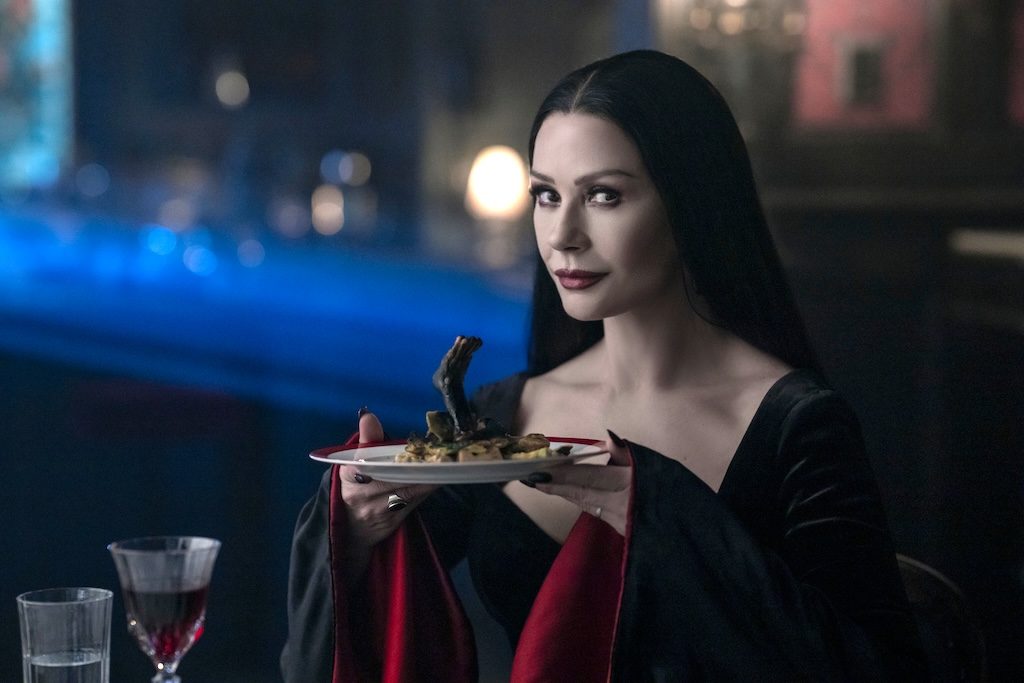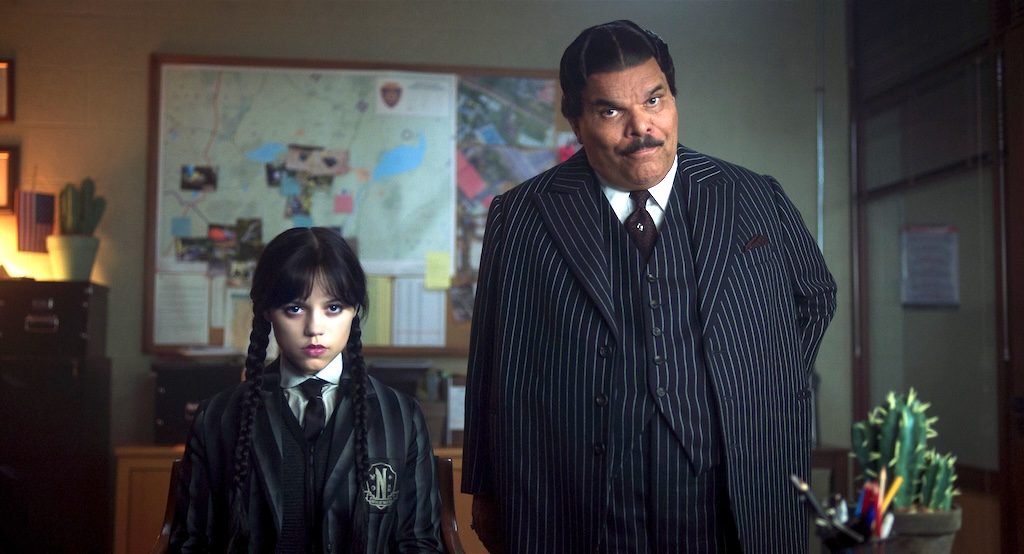“Wednesday” Season 2: Crafting a Modern Gothic Heroine from The Addams Family Universe

When Netflix released Wednesday in 2022, few predicted that a series centered on the deadpan, pigtailed daughter of The Addams Family would become a streaming sensation. Created by Alfred Gough and Miles Millar, with Tim Burton directing the pilot episodes, the show reimagined Wednesday Addams as a Gen Z heroine who lives in her own world, plays by her own rules, and has no desire to fit in with her classmates at Nevermore, a mysterious boarding school for supernatural outcasts.
The source material is used as a springboard not a nostalgic crutch, giving the spinoff show autonomy and creative freedom. Mixing teen drama, horror, and mystery can be chaotic unless unified by a strong tone and voice. Wednesday’s sardonic tone, jabbing dialogue, and gothic visuals keep the series coherent and vibrant.
Making Wednesday Work
Let’s begin by asking the basic question: Why does this spinoff series succeed where others fail?
The key lies in character-driven adaptation. Rather than simply transplanting the aesthetics and kooky storylines of The Addams Family into a new setting, the creators made Wednesday Addams the emotional and narrative core.
“We always saw this as a coming-of-age story, not a reboot,” says co-creator Miles Millar. “We wanted to explore Wednesday as a teenager in a way that hadn’t been done before.”
Wednesday is an outcast among outcasts—dark, cynical, secretive, and unafraid to challenge the status quo. In an age of increasing individuality and rebellion against societal norms, especially among young audiences, she became a symbol of empowered alienation and identity. Weirdos Unite!
At the heart of the series is identity. Wednesday Addams, the ultimate outcast, is now surrounded by others just like her — outcasts, freaks, monsters, witches. Yet she still feels alone. This contradiction gives the show emotional gravity and depth.
“She’s a character who doesn’t change for the world around her, but forces the world to change around her,” says Jenna Ortega. “But we also wanted to show that even someone like Wednesday has moments of vulnerability.”
Audiences love her because she is unapologetically herself. She rejects social conventions, but not emotional depth. In Season 1, her vulnerability is gradually revealed through her relationships at Nevermore Academy—particularly her growing bond with Enid Sinclair (Emma Myers), her spirited werewolf roommate, and her strained relationship with her parents.

Enid Sinclair (Emma Myers). Photo by Bernard Walsh/ Netflix © 2025
Nevermore Academy isn’t just a school—it’s a microcosm of Wednesay’s world and a reflection of her internal state. Her wit, intellect, and anti-hero persona make her a suprenaturally special. She’s also supremely self-aware.
“There were lines of dialogue that made her sound too soft,” Ortega explains. “I fought to keep her deadpan, emotionally distant—but in a way that was earned, not cold.”
From Satire to Serialized Mystery
The Addams Family originated as a 1930s cartoon by Charles Addams, later becoming a sitcom in the 1960s, and then multiple films in the 90s. Historically, the family served as a satirical mirror to mainstream suburban America, much like The Munsters.
Wednesday flips the format and catapults the genre into the 21st century via a supernatural, character-driven mystery.
Rather than satire, Wednesday embraces serialized storytelling, combining supernatural mystery, teen drama, and dark comedy.
“Genre is just a vehicle for character,” notes Alfred Gough. “We wanted to use the mystery to peel back Wednesday’s layers.” She gains purpose as she sheds her cynical, isolationist persona for a witty detective even Miss Marple would envy.
She’s detached yet loyal. Morbid yet funny. Self-isolating, yet secretly desperate for connection. A teen contridiction.
By building her arc around emotional temperance, the show lets tension simmer not just through mystery, but through personality. Dark comedy works best when it reveals truth. Wednesday uses her deadpan tone to hide her character. Ironically, this tone exposes what she doesn’t want to feel, but must confront.
What’s New in Wednesday Season 2?
Season 2 builds on the first season’s strengths. And then adds more.
1. A Shift Toward Found Family Themes
“The second season is about Wednesday realizing she needs people,” Jenna Ortega says, “Even if she hates that fact.”
Season 1 introduced her struggle to connect with others. Season 2 appears to lean into relationship evolution—not just romantic, but platonic and familial. Her friendship with Enid deepens, while her conflict with her mother, Morticia (Catherine Zeta-Jones), is further explored.
2. Bigger World Beyond Nevermore
Nevermore Academy is still central, but the world expands. There’s more time spent outside the school, in pilgrim-founded Jericho, and into supernatural politics beyond the Gates mansion.
“The show will explore the larger world of outcasts and the history of Nevermore,” says showrunner Kayla Alpert. “We’re not just solving murders—we’re asking why these things keep happening to this specific lineage.”

Morticia Addams (Catherine Zeta-Jones) Photo by Helen Sloan/ Netflix © 2025
Why Was Season 2 Split Into Two Parts?
This decision, announced in early 2025, mirrors trends seen in shows like Stranger Things and You. Splitting TV seasons has both a creative and commercial narrative effect.
From a storytelling perspective, splitting the season allows for mini-arcs within a larger narrative. It creates mid-season climaxes and cliffhangers that renew momentum, build anticipation, and audience engagement. It also affords viewers a mini-pause to process part 1, without waiting for two years for the next season. In summary, part 2:
- Builds Anticipation — Two releases create twice the buzz.
- Creates a Mid-Season Twist — A mini-finale around Episode 4 or 5 raises stakes, like an act break in a screenplay.
- Allows for Tonal Shift — Part 1 might focus on character mystery; Part 2 will dive into her family background.
Think of Part 1 as Act 1 and 2A of a screenplay, and Part 2 as Act 2B and 3. Your midpoint break must redefine the goal, raise emotional stakes, and introduce narrative momentum for the back half.
“We’re treating Part 1 and Part 2 almost like two books in the same novel,” says Millar. “There’s a turning point at the break that redefines Wednesday’s mission.”
For writers, this narrative structure demands tighter pacing. Each part must feel complete enough to satisfy, yet unresolved enough to keep audiences craving more.
Season 2 will deepen its exploration of:
- Found Family – Enid, Xavier (Percy Hynes White), and others become more emotionally central.
- Heritage and Legacy – We learn more about the Addams family’s place in supernatural history.
- Responsibility and Sacrifice – Wednesday shifts from rebel to reluctant leader.
“She may hate being the center of attention, but she’s drawn into a fight that demands leadership,” says co-writer Kayla Alpert. “It’s no longer about just solving the mystery—it’s about protecting her people.”

Wednesday Addams (Jenna Ortega) & Gomez Addams (Luis Guzmán) Photo Courtesy of Netflix © 2025
Balancing Tone, Genre And Structure
Writers adapting iconic IP with a loyal fanbase face a dilemma: stay too faithful, and the story feels stale and familiar; stray too far, and it alienates the fanbase. Wednesday strikes a fine balance.
“We were constantly walking a tonal tightrope,” says co-creator Alfred Gough. “It had to be funny, but not a sitcom; dark, but not horror, mysterious, but not melodramatic.”
Tim Burton infuses a whimsical darkness with a YA sensibility into the series.
Wednesday‘s pacing runs at a rapid clip.
- Each episode ends on a cliffhanger beat
- New characters introduced every few episodes
- Teases and reveals spread across a breadcrumb trail
- Emotional revelations paired with plot twists
- This mix of serialized mystery and emotional intrigue ensures viewers keep watching
Final Thoughts: The Power of Reinvention
Wednesday Season 2 proves that IP-driven TV doesn’t have to be reductive or derivative. When characters drive plot, and when emotional honesty is given room to flourish—even in a gothic murder mystery—you get something special.
The success of Wednesday isn’t just about a deadpan teen solving mysteries. It’s about what she represents: strength in individuality, loyalty without sentimentality, finding your tribe, and the power of not fitting in.
[More:Alfred Gough and Miles Millar on Netflix’s ‘Wednesday’]
Join the Discussion!
Related Articles
Browse our Videos for Sale
[woocommerce_products_carousel_all_in_one template="compact.css" all_items="88" show_only="id" products="" ordering="random" categories="115" tags="" show_title="false" show_description="false" allow_shortcodes="false" show_price="false" show_category="false" show_tags="false" show_add_to_cart_button="false" show_more_button="false" show_more_items_button="false" show_featured_image="true" image_source="thumbnail" image_height="100" image_width="100" items_to_show_mobiles="3" items_to_show_tablets="6" items_to_show="6" slide_by="1" margin="0" loop="true" stop_on_hover="true" auto_play="true" auto_play_timeout="1200" auto_play_speed="1600" nav="false" nav_speed="800" dots="false" dots_speed="800" lazy_load="false" mouse_drag="true" mouse_wheel="true" touch_drag="true" easing="linear" auto_height="true"]










You must be logged in to post a comment Login